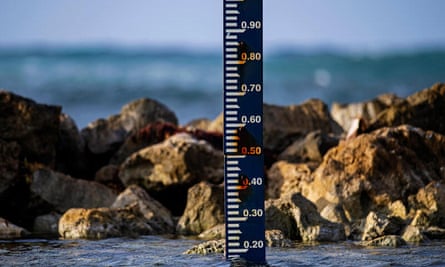The people of the Dutch Caribbean islands are taking legal action against the Netherlands for their role in contributing to climate change.
A group of eight individuals from the Caribbean nation of Bonaire have filed a lawsuit against the Netherlands, alleging that their human rights have been infringed upon due to insufficient efforts to safeguard them from the effects of the climate crisis.
The group, with Greenpeace Netherlands, filed a formal legal challenge against the Dutch government in The Hague on Thursday, asking the district court to order it to cut its greenhouse emissions much more quickly and to help its most vulnerable territories adapt to the impact of the climate crisis.
Bonaire, located approximately 8,000km (5,000 miles) away from the Netherlands’ capital city, became a Dutch special municipality in 2010. The Netherlands has had a presence on the island for 400 years and in 2022, the government issued an apology for the enslavement of its inhabitants.
Due to its location as a flat island, Bonaire is susceptible to significant impacts from climate change, such as severe weather events and an increase in sea levels.
A recent study by the Dutch meteorological institute (KNMI) revealed that the Caribbean Netherlands has experienced a temperature rise of approximately 0.2C per decade since the 1980s. There has also been a decrease in rainfall, especially during the dry season. Scientists predict that this trend will worsen if greenhouse gas emissions continue to escalate.
Onnie Emerenciana, a Bonaire resident and one of the individuals bringing a legal case, expressed that it has been increasingly challenging to cultivate crops due to the rising temperatures, strong winds, and erratic rainfall. They stated, “It has become extremely difficult to successfully plant anything.”
The report from KNMI states that implementing a climate policy targeting emission reduction can have a significant impact on the future of Dutch Caribbean islands, including Bonaire.
A study conducted by Vrije Universiteit Amsterdam, on behalf of Greenpeace, suggests that certain areas of the island may be permanently underwater by 2050 due to rising sea levels. This issue is worsened by the decline of coral reefs, which act as a natural defense against the warming and acidification of the oceans.

The research also determined that the changing climate would worsen health issues on the island and potentially damage its cultural legacy and tourism sector. Bonaire is a well-known spot for diving, and the decline of coral reefs may result in the disappearance of most dive locations, leading to a decrease of over 100,000 visitors.
The islanders, mainly residing in Bonaire and holding Dutch citizenship, are advocating for the Netherlands to increase its efforts towards climate action. They believe the country should make a “fair contribution” to limit global warming to 1.5C above preindustrial levels. This would require achieving net zero greenhouse gas emissions by 2040, a decade earlier than its current goal.
The authorities also desire well-defined strategies, created in collaboration with the locals, to safeguard Bonaire from the effects of the climate crisis. This is to ensure that the island’s residents can still reside there and preserve their customs and heritage for future generations.
They claim that failing to do this is a violation of their human rights, specifically their right to life and privacy for themselves and their family.
According to Eefje de Kroon, an expert in climate justice at Greenpeace Netherlands, the government has neglected to consider the impact of the climate crisis on its Caribbean territories and their potential vulnerability. Despite being renowned for its advanced water management techniques on the mainland, the Netherlands has not conducted any research on how to protect these islands. The islands are not included in the country’s national adaptation strategy.
In May of last year, the group sent a “letter before action” to the Dutch government in an attempt to resolve the matter before resorting to legal action.
Ignore the advertisement for the newsletter.
after newsletter promotion
According to the Dutch finance secretary, Alexandra Carla van Huffelen, in an official statement made in October, the government acknowledges the concerns of the islanders. However, she also stated that the current climate targets of the country are adequate and were recently strengthened.
Regarding adaptation, van Huffelen stated that significant research has already been conducted, but could benefit from a more user-friendly summary for the general public. She mentioned that a climate plan will be created for each of the Caribbean Netherlands BES islands in the current year, guided by a “climate table” led by local residents, as recommended by an advisory report. The project has been allotted €1m (approximately £861,000).
The plaintiffs have communicated with government officials but were unsatisfied, stating that the government did not implement any tangible alterations.
Danique Martis, a social worker, expressed concern that the Caribbean Netherlands have been neglected for an extended period. She is disappointed that the Dutch government, despite being aware of their responsibility, has neglected the safety of the region. To address this issue, legal action is being taken to compel the government to take action.
De Kroon stated that the government’s handling of the issue had already been influenced by the possibility of a lawsuit and that it had brought more attention to the matter. Along with aiding Bonaire, she believes that a favorable decision would also benefit residents of other Dutch Caribbean islands.
The recent legal action is part of a growing trend of climate-related lawsuits in both the Netherlands and globally. In 2019, the Dutch government suffered a significant defeat in the Urgenda case, with the country’s highest court ruling that it had a clear responsibility to safeguard its citizens’ human rights in light of the climate crisis and must take appropriate measures to reduce global emissions in accordance with its fair share.
This recent lawsuit aims to expand on the previous decision and demonstrate the nation’s legal obligations to its entire territories. Similar to other climate-related cases, such as the one initiated by the Torres Strait islanders (known as the Zenadth Kes) against Australia, it underscores the unique susceptibility of island societies.
Source: theguardian.com



